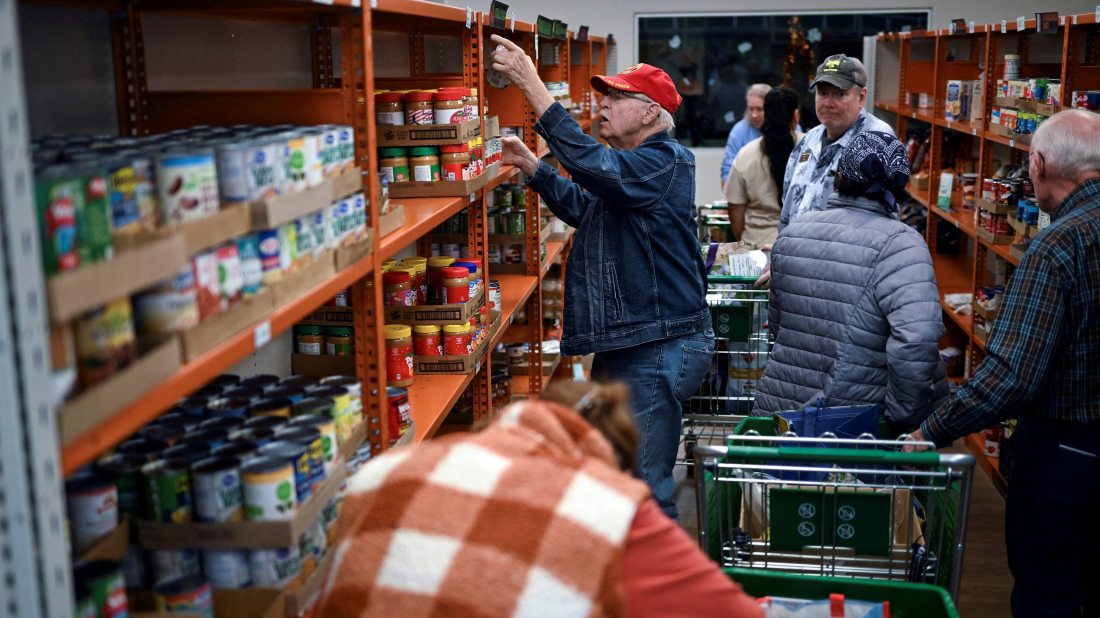Antonio José Seguro wins Portugal presidential runoff against far right
Portugal’s moderate Socialist Antonio José Seguro won the presidency on Sunday, defeating far-right challenger André Ventura in a runoff vote that...

U.S. states this week warned food aid recipients that their benefits may not be distributed in November if the federal government shutdown stretches into its fourth week.
Warnings on more than two dozen state websites are sounding the alarm over a potential unprecedented benefit gap for millions of Americans relying on federal food assistance. More than 41 million people who receive aid from the Supplemental Nutrition Assistance Program (SNAP), commonly known as food stamps, and nearly 7 million enrolled in the Special Supplemental Nutrition Program for Women, Infants and Children (WIC) could face serious disruptions in November if the federal government shutdown continues.
Experts say such a gap could sharply increase already rising hunger and food insecurity rates across the U.S. The administration of President Donald Trump has reduced federal funding for food banks this year and is implementing stricter work requirements for SNAP, potentially pushing more people off the program.
“Families are going to be hurt by this should it continue, at a time we know families are struggling to make ends meet,” said Minerva Delgado, director of coalitions and advocacy at the Alliance to End Hunger.
States Brace for November Benefit Delays
Several states, including Minnesota, California, Pennsylvania, and Texas — have warned that November benefits may not be issued if the shutdown persists into next week. According to anti-hunger groups and food banks in 11 states, local organizations are already preparing recipients for possible aid interruptions.
“If benefits are not delivered, more people would skip meals or make other sacrifices, like falling behind on bills, to keep their families fed,” said Chris Bernard, CEO of Hunger Free Oklahoma.
An Agriculture Department spokesperson described the situation as an “inflection point for Democrats,” as both parties continue to trade blame for the shutdown — now the second longest in U.S. history. Democrats have withheld votes on a spending bill, citing concerns about rising health insurance costs for Americans.
Agriculture Secretary Brooke Rollins told NewsNation that SNAP benefits would “go away” without a deal to reopen the government by November.
Food Banks Under Strain
Some states have already published early cutoff dates for food aid. Texas’ Health and Human Services Commission, for example, warns that “SNAP benefits for November won’t be issued if the federal government shutdown continues past Oct. 27.”
Oregon’s Department of Human Services urged residents to locate free food resources and make contingency plans in case benefits are delayed.
Food banks, however, say they are already overwhelmed. “This could get really bad. We’re already serving more people than before COVID,” said Jim Conwell of the Greater Chicago Food Depository.
Unusual Delays and Unclear Guidance from USDA
Typically, SNAP and WIC continue during short federal shutdowns, but this time states report limited communication from the U.S. Department of Agriculture (USDA). On October 10, the USDA instructed states not to send benefit data to electronic benefit transfer (EBT) processors — an unprecedented move.
The USDA holds about $5 billion in contingency funds, enough to cover only part of a single month’s SNAP benefits, which total roughly $8 billion. The agency has not said whether it plans to use those funds.
Earlier this month, the Trump administration redirected $300 million from tariff revenues to cover October WIC benefits, but there has been no indication that similar funding will be extended into November.
Without additional resources, WIC could face a historic service disruption, warned Georgia Machell, CEO of the National WIC Association.
“November could see a historic disruption to WIC services,” Machell said.
Storm Leonardo hit Spain and Portugal on Tuesday, forcing more than 11,000 people from their homes, as a man in Portugal died after his car was swept away by floodwaters and a second body was found in Malaga.
Iran would retaliate by striking U.S. military bases across the Middle East if it comes under attack by American forces, Foreign Minister Abbas Araghchi said on Saturday (7 January), stressing that such action should not be seen as targeting the countries hosting those bases.
At least 31 people have been killed and scores wounded in a suicide bombing at a mosque in Pakistan’s capital, Islamabad, during Friday prayers, prompting widespread international condemnation.
U.S. and Ukrainian negotiators have discussed an ambitious goal of reaching a peace agreement between Russia and Ukraine by March, though the timeline is widely viewed as unrealistic due to deep disagreements over territory, according to multiple sources familiar with the talks.
A Japanese city near Mount Fuji has cancelled its annual cherry blossom festival, saying growing numbers of badly behaved tourists are disrupting daily life for residents.
A Florida university has become a new hotspot in a widening U.S. measles outbreak, with health officials confirming multiple infections and hospitalisations.
The World Health Organization has added the Nipah virus to its list of the world’s top 10 priority diseases, alongside COVID-19 and the Zika virus, warning that its epidemic potential highlights the global risk posed by fast-spreading outbreaks.
Belgian authorities are examining suspected cases of infants falling ill after consuming recalled Nestle baby formula, amid warnings that confirmed infections may be underestimated due to limited testing requirements.
Two Nipah infections involving health workers in India have triggered heightened screening across Southeast Asia as authorities move to prevent the high fatality virus from spreading beyond the country.
The World Health Organization (WHO) has said it regrets the United States’ decision to withdraw from the UN health agency and hopes Washington will resume active participation in the future.
You can download the AnewZ application from Play Store and the App Store.

What is your opinion on this topic?
Leave the first comment